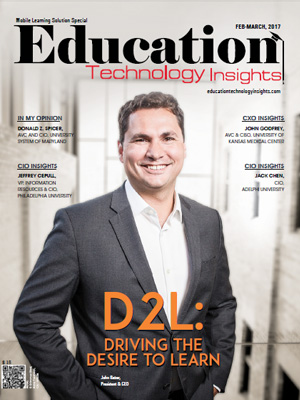THANK YOU FOR SUBSCRIBING
Be first to read the latest tech news, Industry Leader's Insights, and CIO interviews of medium and large enterprises exclusively from Education Technology Insights
Still mulling on this...
Scott Hamm, Director of Online Education, Hardin-Simmons University
 Scott Hamm, Director of Online Education, Hardin-Simmons University
Scott Hamm, Director of Online Education, Hardin-Simmons UniversityReflections on the pandemic have become so common place that their value may be overlooked as is often the case when something has been a headline for so long. One natural consequence of a post-pandemic world is the increased mediation of technology in our work, education, socialization, and consumption. The affordance of technology has given way to a more negotiated exchange andincreased agency for the user in determining the desired level of virtual or in-person waysto connect with the world and others.
The lessons learned from the pandemic necessitated remote learning experienceusing Zoom and other synchronous approaches have moved technology-enhanced pedagogy in ways that the “new normal” is now just, normal. An increased engagement with technology and the continued growth of online education means a requisite increase in authentication to ensure the identity of the end-user. When the authentication secures my credit card when traveling and allows a seamless transition through airport scanning, I am happy for the technology assurances.
However, technology is not a flat or unbiased tool that is reliant only on how it is used. Technology responds to how it is designed and the assumptions of the designers. Facial recognition algorithms have demonstrated inequitable identification based on gender and skin tone. Verifying the identity of an online student using proctoring software presents inequities for students of color. Current work by the Design Justice Network interrogates the design processes and examines ways in which the people most adversely impacted by design inequities can be more included in the design processes which impact all of our lives.
Online learning continues to expand and offer learners increased choice in their educational approach.Online course design is regulated by best practices,accreditation standards, and evidence-based approaches that incorporate important aspects of a well-designed course. Accessibility, appropriate learning objectives, regular and substantive interaction, and other assurances are required and vital to a successful online learning experience.
In research done by the author and Dr. Stephanie Hammthey examined the design processes of online courses to determine the impact of those processes on the experience and perception of students of color in those courses. The Distance Education Learning Environment Survey (DELES) was used with cultural competence questions added to the survey with permission from the author. Students of color believed the courses were well-designed but the content and approach to the learning in the courses were not in line with their culture or ethnic identity. They were welcome guests in good online courses to which they believed did not belong.
The design process and components of good online courses needto be interrogated to ensure that the online course design is providing culturally competent courses for the students who would be participating in those courses. Students identified assessments, specifically, case studies as the primary aspect of their online course in which they felt least included.
Online programs often advertise themselves using terms that implicate a global experience and desire for a multicultural experience, but the students find themselves in a course design by and for the host culture.Course design is not flat or unbiased and requires intentional examination of the design process. To gain greater insight into the design process, follow up research by the authors asked faculty and course designers to assess their online courses based on the same five areas of cultural inclusion extrapolated from the initial student surveys. Interestingly, faculty and course designers stated that assessment and case studies was their area they believe to be least represented and inclusive.
Read Also
Localising Curriculum, Globalising Opportunity
Elevating Education with Purposeful Tech-Integration
Digital Transformation with User-Centric Solutions and Collaborative Leadership
Connecting Education and Technology for Lasting Change
Putting Students First in a Global Classroom
Balancing Technology-Driven Teaching with Traditional Learning

I agree We use cookies on this website to enhance your user experience. By clicking any link on this page you are giving your consent for us to set cookies. More info

However, if you would like to share the information in this article, you may use the link below:
mobile-learning.educationtechnologyinsightsapac.com/cxoinsights/still-mulling-on-this-nid-1968.html
















.png)






